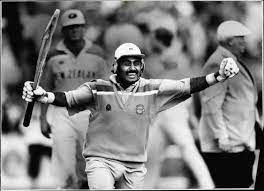The hatred for Ahmedabad and Narendra Modi from certain quarters is well known. And there are reasons.
An argument is being built that "Sports have been weaponised" and let us blame Modi and Ahmedabad for the same.
But the fact of the matter is the same crowd is forgetting what all went on in the name of Cricket in a place called Sharjah. Without 'Sharjah' involvement perhaps the fixing and betting menaces would not have virtually got 'mainstreamed' in the gentleman's game called cricket.
Look at the 'argument' built up by Pakistani newspaper 'Dawn'.
It says : "There may be a political subtext to the crowd’s antics, in Ahmedabad in particular. The city happens to be the pride of Gujarat, Prime Minister Modi’s home state. In parroting jingoist slogans, the spectators shared characteristics with the crowd that greeted Donald Trump at the very same Narendra Modi Stadium in February 2020.
"One can’t think of any other Indian state, leave alone another country, where a stadium resembled a politically staged show. The shabby treatment meted out to Pakistani players in the match against India reflected not spontaneous but induced frenzy, which has an echo in history."
It also says,
"Mr Modi seems to have made cricket an extension of his narrow politics, the opposite of the advice his peer A.B. Vajpayee sagaciously gave Indian cricketers heading to Pakistan. “Win the matches, but also win the hearts.”
The spirit was missing in Ahmedabad, but, happily, not in other parts of India.
It may be stated that since the 2008 attacks on Mumbai, India and Pakistan have not played much as "bilateral series" as New Delhi and Islamabad remain at diplomatic loggerheads.
No less than India's suave External Affairs Minister Dr S Jaishankar has said in December 2022 that his government would not favour India-Pakistan bilateral cricket series.
"Tournaments keep coming and you are aware of the government's stand. Let's see what happens. It is a complicated issue. Will you talk to me if I put a gun on your head? If your neighbour aids terrorism out in the open and there is no mystery about who the leaders are, where the camps are. We should never think that cross-border terrorism is normal.

Team India: WCC 2023

"Give me another example where one neighbour is sponsoring terrorism against another. There is no such example. In a way, this is not even abnormal, but exceptional, " he has said.
The last time India and Pakistan have played any bilateral series is 2012.
"You know our stand on cricket. We should never accept that a country has the right to sponsor terror. Unless we don't delegitimize this, it will continue. So, there should be global pressure on Pakistan. The pressure won't come unless the victims of terror don't voice themselves. India should, in a way, lead the way because our blood is spilled," said EAM S Jaishankar at a media conclave.
"More than 120,000 fans thronged the Narendra Modi Stadium in India’s Ahmedabad on Saturday to witness the ICC Men’s Cricket World Cup’s box office fixture between archrivals India and Pakistan.
Nearly all of them, however, were Indian fans and they were cheering their team with energy levels as intense as they could get," reported 'Dawn', actually an AFP story.
India steamrolled Pakistan by seven wickets in a lopsided blockbuster match to maintain their unblemished 50-overs World Cup record against their neighbours.
To make it even more intimidating for the Pakistan players, the chants by the stadium announcer and the spectators were, obviously, only to buck up the home side. So was the case with the music being played at the cauldron-like venue.
Pakistan team director Mickey Arthur felt it all and did not hold himself from being “brutally honest” about what he felt was a partisan atmosphere. “It didn’t seem like an ICC event to be brutally honest,” Arthur said in the post-match press conference when asked how much a factor the partisan crowd was against a “timid” Pakistan team. “It seemed like a bilateral series; it seemed like a BCCI (Board of Control for Cricket in India) event.”
The trend was such that Pakistan dominated India in one-day internationals, primarily in Sharjah, and did so in ominous fashion. This continued until the Indian government banned the venue and directed the cricket board not to send a team for the 2001 Sharjah Cup.
A lot has been written about Pakistan's inability to get past India in ICC tournaments. For over a decade, however, India found it tough getting past their traditional rivals in the shorter version of the game but managing to beat Pakistan in all the World Cup encounters.
Some called it a "jinx", while others called it the "ghost of Sharjah".
The game in Sharjah came under the needle of suspicion with accusations of corruption surfacing time and again but analysts, to this day, have remained confounded as to the veracity of those claims.
Pakistan reigned supreme, on most occasions, in Sharjah during this period of around fourteen years. Pakistan were, no doubt, a formidable outfit with a world class bowling attack comprising Imran Khan, Wasim Akram, Waqar Younis, and Abdul Qadir. The batting was no less brilliant with the likes of Javed Miandad, Saleem Malik, Saeed Anwar, and Inzamam-Ul-Haq.
So, did the Pakistani dominance in Sharjah emanate from inherent talent in the squad, boosted by massive support in the stands or was there something shadowy beneath the surface?
Was the ghost of Sharjah for real? (courtesy - SportsKeeda.com)
Even a Bollywood film was made much later. Emraan Hashmi plays Azharuddin while Prachi Desai is the cricketer’s first wife, Naureen. Nargis Fakhri plays film actor Sangeeta Bijlani, Azhar’s second wife. The couple separated after a marriage of 14 years.
ends









No comments:
Post a Comment